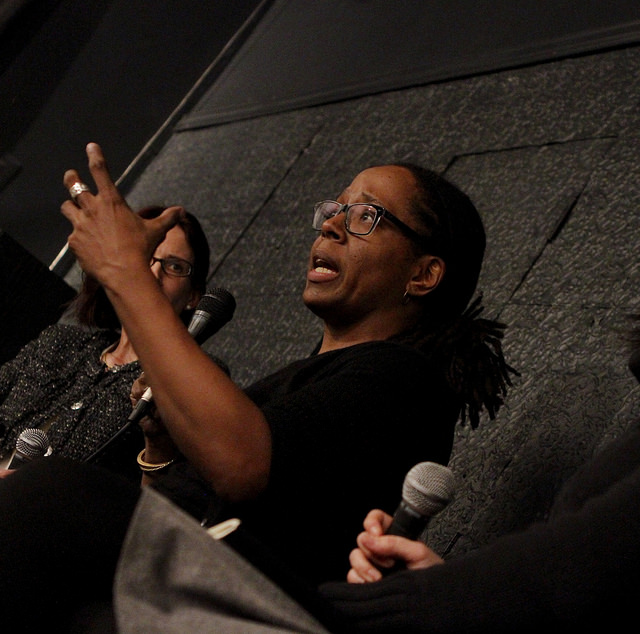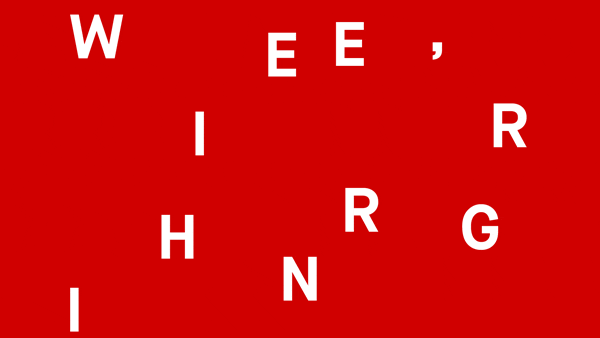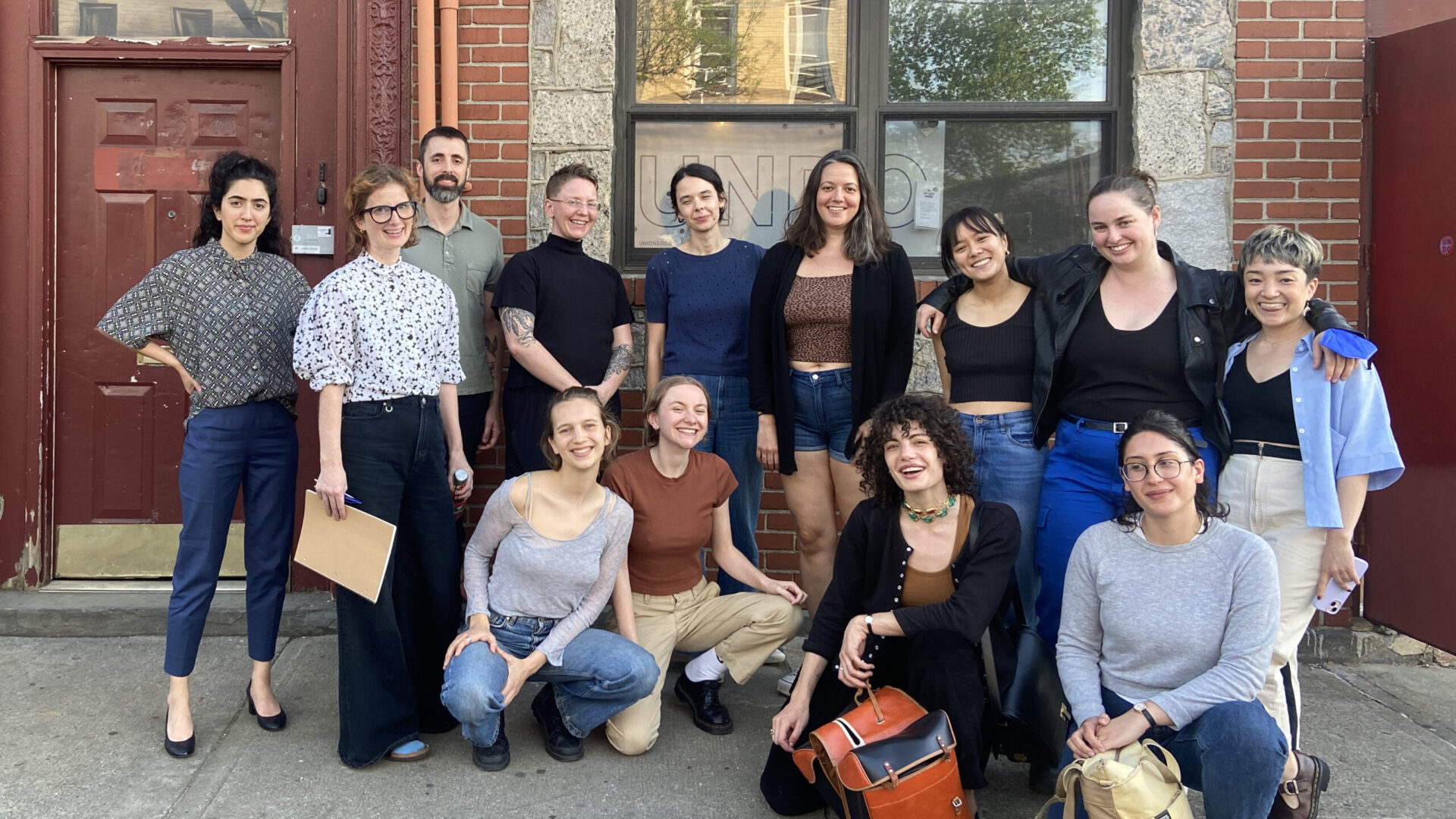Audience Member 2: Thanks. I just wanted to ask a question about how you understand what it means to be researching a history of the Klan? What that stands in for for you. I really appreciated so many of the things you said about not wanting to show brutalized Black bodies and using other people’s access. But, looking back at this amazing body of work, stepping back, what are you trying to show us? I have a lot of thoughts, but I like to hear what you think it means. What does it mean to tell the story of the Klan? Or, more accurately, stories.
DB: The first time I presented the Toronto iteration, I felt so conflicted about it. So conflicted, that I hosted a reading series which borrowed a piece called ‘Can I Be Black and Look at This.’ The author, I can’t remember her name, was writing about the Rodney King beating and what it means to repeatedly look at images like that and/or make use of those images. She asks what that says about you as an individual both psycically and artistically. I felt like I was betraying somebody, a community, by doing that. Focusing on the Klan is such a ridiculous path to take as a Black woman, in so many ways. Really ridiculous. But now, what I’m interested in is white studies. There’s this idea that Black people make ‘Black art’ and that my job is to reproduce images of Black people. I don’t buy that, really. Part of what this is about is turning that around. Maybe it’s a generational thing. I am of a generation where I can ask different questions and I won’t go to jail. There’s a privilege in the access I have and somewhere in there is an understanding that I have a responsibility. Because of the generation that I’m in, I have a responsibility to turn the page, or turn the camera around. I have to start asking different questions. I have a university education, I have access to the gallery system, I feel obliged to ask harder questions. I have to do things that are harder than ‘this is what I look like’ over and over again. What does it do if I just make pictures of me being oppressed? It just repeats a narrative. We have a hell of a lot more agency. I realize what the art world expects, and I realize what the film world expects of Black ‘makers.’ In the states, especially, there’s a very particular narrative that gets pushed forward. I want to remind people that there are other ways to look at this. I feel much stronger about my position and much more confident about this field of white studies and there are other people talking about it as well.
RG: I just want to add that my father wrote a book called The Trouble I’ve Seen. He’s very clear about it being a white journalist writing about a Black movement.
DB: Even still, the work he did is incredibly important. He had access at that time and took responsibility. He did the work. When we were preparing for the Philadelphia show, Harold asked me about Mark Tribe. Tribe has been restaging these political events and Harold [Mendez] was talking about criticism towards Tribe. A lot of people ask whether or not he really has the right to do this stuff. My response was, Mark Tribe may have privilege, he may have money, he may have a job, but, at the end of the day, he’s the one doing the work. I don’t care, he’s one more person bringing this history forward. On the one hand, there’s gotta be room for me to experiment with what I can talk about. There’s also gotta be room for people like Mark to talk about things. If there’s one thing I’ve learned doing this work, it’s that there’s a notion that Black people have a sense of ownership over their oppression. There’s only certain people who can talk about it. When you keep that going, it just sets us up for a huge fall. It keeps us where we are. There has to be room for other people to talk about this stuff. I’d like to think that I have access to a lot more than just pain. Mark and other artists like him should have access to more than just, ‘Gee, I don’t know.’
Audience Member 3: You’ve mentioned that, in your work, you have to approach the subject from the position of a black woman. Is this something that plays into performances that you’ve done, maybe ones we didn’t see here?
Cheap DB: Well, at the very, very, very core of everything I do, I am working out my relationship with my mother.
RG: And me with my father.
robaxin price without insurance
DB: That’s what it has always been about. My mother is a profoundly complicated woman, who, through my research I’ve come to understand. I’ve come to understand what she lived through, she doesn’t talk about it. She’s one of three in my family that has a high school education and her understanding of the world is very particular. She’s very proud of her ability to forget. She grew up in segregated Canada and then integrated Canada. I don’t know if any of you can imagine that. That’s a hell of a lot of movement in one lifetime. So that’s where it comes from as far as gender goes. It’s really about me and my mom. Maybe my grandmother as well. Maybe even further, me and my great-grandmother. Much of the work that I do favors the black women in my life, in some way or another. It’s really fascinating. I actually funded all of this work with a grant that I got to do a piece about my mom. I didn’t make the piece. I got stuck here.
RG: So you made a piece about Regan’s dad.
DB: Yeah, I made a piece about your dad. The council said, ‘that’s not enough.’ So I still have to make that original piece. I have been putting off my final report for this grant for years now. I’m almost there. I tried to convince them that this was about her. They didn’t go for it. It’s funny, I’ve gotten through this iteration of the Philly project and all of this. Now, I can do the piece about my mother. I now understand my mother. It’s a weird way to get there, but that’s what it’s about. I’m not sure if that entirely answers the question. There is certainly something about gender in performing Paul Good or Robert Shelton. But, I’m not so hung-up about teasing that out. It doesn’t really matter to me so much. My mom is what really matters.
Audience Member 4: I’m interested in what relationship you have with actual historians. Have you encountered them? Have they said, you know, ‘what you’re doing is interesting, but it’s not really history.’ Or, anything like that?
DB Order : I have really great relationships with historians. Because it’s art that we’re talking about, people are much more willing to talk and just shoot the shit. Historians, if they’re in the academy, have a whole bunch of ethical concerns. They have to go about their questioning in a very particular way. I don’t have to do that. I can go about this over a scotch and it’s still ethically okay. At the same time, because I have such a personal relationship, I have a way of getting to information that historians can’t get to. I’ve maintained an ongoing relationship with historians throughout all of this. Whatever I find, I also give to historians so that it can inform their practice. One of the key tips, the tip about Lancaster County, came from a historian.
Audience Member 5: You’ve never had any sort of negative push-back?
DB: No, I actually get a ‘wow, this is cool’ a lot. I’m, admittedly, running in a circle of historians that are fairly progressive. There are more conservative historians out there, for sure. But, the ones that I’m engaging with are excited about getting at history in different ways. The historians I’m dealing with at the University of Toronto are really concerned with the next generation of historians. They aren’t just interested in reading fuddy-duddy books, they want to go at it differently. They recognize that film is another document, photography is another document, so they’re open to interpretations. I’ve been very lucky, for the most part.

Audience Member 6: Regan, I was curious about how your father’s papers ended up at Emory specifically.
RG: I think I just called them.
DB: Well, did you ever think of any other institutions?
RG: I wasn’t thinking very clearly, during those years. I honestly can’t remember. I think I just thought they should be there. I called and dealt with it.
DB: How were they?
RG: They were very nice, as far as I can remember.
LP: What year did they go to Emory?
RG: I think it was 2007. My father died in 2005 so it was soon after that.
Audience Member 7: Your father didn’t leave instructions for what to do with the material? What does that tell us about him?
RG: (Laughs) Not great planning, probably? Not a great planner. Not a technical person, as you might have heard. I was actually afraid to donate the tapes to Emory. My brother and I, I mean, just watching our dad turn on the TV was horrible. Listening to the tapes we could tell when he was getting nervous and messing up. I was telling you, Melanie, about him in the 70s with his Radioshack tape recorder. And then those horrible little things that could suction-cup onto the phone. Remember those? We’d be hearing my dad conduct an interview and all of the sudden you’d hear, ‘Goddamn it!’ The thing had popped off. Or, he’d finish an interview and he’d realize he hadn’t hit record. So, yeah, not a great planner.
Audience Member 7: But he did think it was important?





